Forms of the Old Testament Literature Series | FOTL (18 vols.)
Digital Logos Edition
Overview
The Forms of the Old Testament Literature Series presents a form-critical analysis of the Old Testament (Hebrew Bible) based on a standard outline and methodology. Fundamentally exegetical, the Forms of the Old Testament Literature volumes examine the structure, genre, setting, and intention of the biblical literature in question. Basic to this series is its attempt to study the history behind the form-critical discussion and to reveal the exegetical process in order to enable students and pastors to engage in their own analysis and interpretation of the Old Testament texts. Each volume includes thorough bibliographies and a glossary of the genres and formulas identified in the commentary.
- Form-critical analysis of every book in the Old Testament
- Structure, genre, setting, and intention are examined
- Glossary of genres and formulas
- Ideal for students and pastors
- Title: Forms of the Old Testament Literature Series
- Series Editors: Rolf P. Knierim, Gene M. Tucker, and Marvin A. Sweeney
- Series: Forms of the Old Testament Literature Series (FOTL)
- Publisher: Eerdmans
- Volumes: 18
- Pages: 5,324
- Resource Type: Commentaries
- Topic: Biblical Studies, Form Criticism
- Genesis, with an Introduction to Narrative Literature by George W. Coats
- Exodus 1–18 by George W. Coats
- Numbers by Rolf P. Knierim and George W. Coats
- Judges by Serge Frolov
- 1 Samuel by Antony F. Campbell
- 2 Samuel by Antony F. Campbell
- 1 Kings, with an Introduction to Historical Literature by Burke O. Long
- 2 Kings by Burke O. Long
- 1 and 2 Chronicles by Simon J. De Vries
- Wisdom Literature: Job, Proverbs, Ruth, Canticles, Ecclesiastes, and Esther by Roland E. Murphy
- Psalms, Part 1, with an Introduction to Cultic Poetry by Erhard S. Gerstenberger
- Psalms, Part 2, and Lamentations by Erhard S. Gerstenberger
- Isaiah 1–39, with an Introduction to Prophetic Literature by Marvin A. Sweeney
- Ezekiel by Ronald M. Hals
- Daniel, with an Introduction to Apocalyptic Literature by John J. Collins
- Hosea by Ehud Ben Zvi
- Micah by Ehud Ben Zvi
- Minor Prophets, Part 2 by Michael H. Floyd
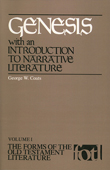
Genesis, with an Introduction to Narrative Literature
- Author: George W. Coats
- Series Editors: Rolf P. Knierim, Gene M. Tucker, and Marvin A. Sweeney
- Series: Forms of the Old Testament Literature Series (FOTL)
- Publisher: Eerdmans
- Publication Date: 1983
- Pages: 334
In the introduction to this volume, George Coats discusses narrative in general and the principal Old Testament narratives in particular. He then sets the book of Genesis in its larger Old Testament context, analyzing its major sections and subsections, and uses the succeeding chapters to treat each of the major sections individually.
A most welcome book. It adds several dimensions to the interpretation of [Genesis]. Because of the comprehensiveness of its treatment of Genesis and the balanced judgment of Professor Coats, the book functions, at times, as a test of the validity of its own major method—form criticism in Old Testament study.
—Matitiahu Tsevat, Hebrew Union College
George W. Coats (1936–2006) was professor emeritus of Old Testament at Lexington Theological Seminary, Kentucky. He wrote the commentary on Exodus 1-18 and coauthored Numbers in this series.
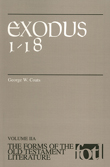
Exodus 1–18
- Author: George W. Coats
- Series Editors: Rolf P. Knierim, Gene M. Tucker, and Marvin A. Sweeney
- Series: Forms of the Old Testament Literature Series (FOTL)
- Publisher: Eerdmans
- Publication Date: 1999
- Pages: 190
More than twenty-five years in preparation, this present study provides a form-critical analysis of the first eighteen chapters of the book of Exodus. Dividing his discussion between the Exodus and Moses traditions and the wilderness traditions, Coats examines each unit of the text of Exodus in turn, showing how the units’ internal structures reveal the genre and social setting in which the book was written and what that setting and genre mean for proper interpretation. Illuminating to scholars and students alike, this volume will open up a new perspective on this important section of Scripture.
George Coats has long been known for his perceptive studies of Exodus, and now, in this volume, his detailed analysis of the structure of the first eighteen chapters appears. As a form-critical analysis of Exodus, this commentary will probably not be surpassed.
—Donald E. Gowan, Pittsburgh Theological Seminary
George W. Coats (1936–2006) was professor emeritus of Old Testament at Lexington Theological Seminary, Kentucky. He wrote the commentary on Exodus 1-18 and coauthored Numbers in this series.
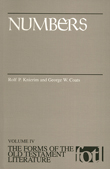
Numbers
- Author: Rolf P. Knierim and George W. Coats
- Series Editors: Rolf P. Knierim, Gene M. Tucker, and Marvin A. Sweeney
- Series: Forms of the Old Testament Literature Series (FOTL)
- Publisher: Eerdmans
- Publication Date: 2005
- Pages: 388
Knierim and Coats make clear what has traditionally been a difficult biblical text, using the exegetical methods of the recently redesigned form-critical approach to Old Testament literature. Following an extensive introduction to the historical and social background of Numbers, the commentary leads readers unit by unit through the text, highlighting the literary development of Numbers and the meaning that it meant to convey to its audience.
This commentary on Numbers is an admirable addition to the FOTL series. Rolf Knierim and George Coats have succeeded in maintaining the delicate balance of the series between the study of literary forms and the description of the author’s social context, which infuses the forms with conceptual and semantic meaning. The result is a commentary both for the literary critic seeking a clear description of the genres in Numbers and for the social historian investigating the cultural forces at work in the formation of the book.
—Thomas B. Dozeman, United Theological Seminary
Knierim and Coats recognize that Numbers is a ‘literary composite’ reflecting ‘the convictions of the many generations’ responsible for it. Aware of these many generations and ‘seemingly incoherent organization of the work,’ they nevertheless pay full attention to the shape and meaning of the present biblical text, the ‘final outcome’ of the long growth process of Numbers. Much will be learned from this commentary.
—Antony F. Campbell, Jesuit Theological College
Rolf P. Knierim is Professor of Old Testament Emeritus at Claremont School of Theology and Avery Professor of Religion Emeritus at Claremont Graduate University.
George W. Coats (1936–2006) was professor emeritus of Old Testament at Lexington Theological Seminary, Kentucky. He wrote the commentary on Exodus 1-18 and coauthored Numbers in this series.
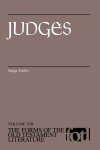
This commentary is the eighteenth published volume in The Forms of the Old Testament Literature (FOTL)—a series that aims to present a form-critical analysis of the books and units in the Hebrew Bible. Serge Frolov’s valuable study of Judges, addressing both synchronic and diachronic perspectives, offers the first full-scale form-critical treatment of Judges since 1922 and represents an important application of form criticism as practiced today.
Fundamentally exegetical, Frolov’s work examines the structure, genre, setting, and intention of Judges. Focusing on the canonical Hebrew text, Frolov argues that what we know as the book of Judges is not a literary unit but rather a series of interconnected units that are for the most part closely linked to adjoining books. In particular, he shows how the sequence “apostasy-oppression-repentance-deliverance’ traverses the boundary between Judges and Samuel. Frolov also analyzes the history behind the form-critical discussion of this book and exposes the exegetical process so as to enable students and pastors to engage in their own analysis and interpretation of Judges.
Serge Frolov is Nate and Ann Levine Professor of Jewish Studies and associate professor of religious studies at Southern Methodist University in Dallas, Texas.
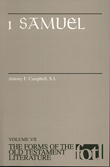
1 Samuel
- Author: Antony F. Campbell
- Series Editors: Rolf P. Knierim, Gene M. Tucker, and Marvin A. Sweeney
- Series: Forms of the Old Testament Literature Series (FOTL)
- Publisher: Eerdmans
- Publication Date: 2003
- Pages: 368
Antony Campbell’s valuable form-critical analysis of 1 Samuel highlights both the literary development of the text itself and its meanings for its audience. A skilled student of the Hebrew Scriptures and their ancient context, Campbell shows modern readers the process of editing and reworking that shaped 1 Samuel’s final form. As Campbell’s study reveals, the tensions and contradictions that exist in the present text reflect a massive change in the way of life of ancient Israel. Samuel, the first prophet, here emerges to preside over the rise of Saul, Israel’s first king, to be the agent of Saul’s rejection, and to anoint David as Israel’s next king and the first established head of a royal dynasty. The book of 1 Samuel captures the work of God within this interplay of sociopolitical forces, and Campbell fruitfully explores the text both as a repository of traditions of great significance for Israel and as a paradigm of Israel’s use of narrative for theological expression.
This is the finest Old Testament commentary ever to come from Australia. Normally I handle biblical commentaries like a telephone directory: I consult them as I need information. But Antony Campbell’s commentary on 1 Samuel is such a pleasure to read that I devoured it like a novel. Despite all that has been written recently about Samuel and David, Campbell’s book—a new highlight in the FOTL series—contains much about both of them that is new.
—Norbert Lohfink, Hochschule Sankt Georgen, Frankfurt, Germany
Antony F. Campbell is professor of Old Testament at Jesuit Theological College, Parkville, Australia. His other books include Joshua to Chronicles: An Introduction and God First Loved Us: The Challenge of Accepting Unconditional Love.
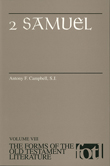
2 Samuel
- Author: Antony F. Campbell
- Series Editors: Rolf P. Knierim, Gene M. Tucker, and Marvin A. Sweeney
- Series: Forms of the Old Testament Literature Series (FOTL)
- Publisher: Eerdmans
- Publication Date: 2005
- Pages: 256
Beginning where he left off in his volume on 1 Samuel, Campbell unpacks the wealth of insight inherent in 2 Samuel by paying close attention to the literary structure of the book. Following a comprehensive introduction, the commentary carefully analyzes the major sections of 2 Samuel and each passage within them. In the process, Campbell reveals the diversity of views that existed in Israel’s traditions and highlights the primacy of theology over history in Israel’s thinking.
This volume in the FOTL ommentary Series shows an imaginative and well-informed push beyond form criticism into newer, more dynamic methods of interpretation. Antony Campbell is a master of this narrative material and is able to exhibit the deep artistic character of the text, making for a most welcome and fresh read. His commentary is informed on critical data but lingers with that data only in order to see the artistic force of the text itself.
—Walter Brueggemann, Columbia Theological Seminary
Antony F. Campbell is professor of Old Testament at Jesuit Theological College, Parkville, Australia. His other books include Joshua to Chronicles: An Introduction and God First Loved Us: The Challenge of Accepting Unconditional Love.
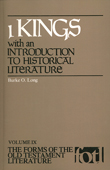
1 Kings, with an Introduction to Historical Literature
- Author: Burke O. Long
- Series Editors: Rolf P. Knierim, Gene M. Tucker, and Marvin A. Sweeney
- Series: Forms of the Old Testament Literature Series (FOTL)
- Publisher: Eerdmans
- Publication Date: 1984
- Pages: 281
Long begins this volume with a discussion of the nature of historical literature and a survey of its important genres: list, report, story, and history. He then focuses on 1 Kings as an example of historical literature, first analyzing the book as a whole and then unit-by-unit. The work is enhanced by extensive bibliographies and a glossary of genres and formulas which offers clear, thorough definitions with examples.
Burke Long is William R. Kenan Jr. Professor of Religion and the Humanities Emeritus at Bowdoin College, Brunswick, Maine. In addition to contributing to many journals, he is the author of The Problem of Etiological Narrative in the Old Testament.
A clear, forceful, and innovative presentation of historiographic forms in the Book of Kings. It sets a high standard for the subsequent treatment of historical narrative both within this series and in the Old Testament studies in general, and will serve as an important reference work for years to come.
—John Van Seters, University of North Carolina, Chapel Hill
Burke Long is William R. Kenan Jr. Professor of Religion and the Humanities Emeritus at Bowdoin College, Brunswick, Maine. In addition to contributing to many journals, he is the author of The Problem of Etiological Narrative in the Old Testament.
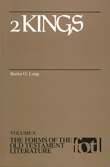
2 Kings
- Author: Burke O. Long
- Series Editors: Rolf P. Knierim, Gene M. Tucker, and Marvin A. Sweeney
- Series: Forms of the Old Testament Literature Series (FOTL)
- Publisher: Eerdmans
- Publication Date: 1991
- Pages: 338
Long views 1–2 Kings as a substantially unified written work of historiography, produced during the Babylonian exile. Hence he begins his detailed form-critical commentary on 2 Kings where he left off in his volume on 1 Kings. Following the series format, Long discusses the text of 2 Kings unit by unit and integrates his form-critical work with a discussion of the book’s literary art (e.g., style, metaphor, imagery) to expose “the narrative genius which awakens imaginative response in the reader.”
Burke O. Long completes his insightful exposition of ancient Israel’s great history document in adding this volume on 2 Kings to his earlier volume on 1 Kings. As a masterful interpreter of the shape and intent of Scripture, he has few equals. More than anything else, his two volumes demonstrate the central importance of the innovative type of analysis promoted by the FOTL series within the expanding discipline of biblical exegesis.
—Simon J. De Vries, Methodist Theological School in Ohio/p>
Burke Long has written a shrewd, discerning, and comprehensive study that will become an enduring point of reference for future study. It is evident that Long knows all the literature in a thorough and masterful way. He is, moreover, intentional about method, and works his method with power and insight….His book is a model for mobilizing detail into a sensible and illuminating whole.
—Walter Brueggemann, Columbia Theological Seminary
Burke Long is William R. Kenan Jr. Professor of Religion and the Humanities Emeritus at Bowdoin College, Brunswick, Maine. In addition to contributing to many journals, he is the author of The Problem of Etiological Narrative in the Old Testament.
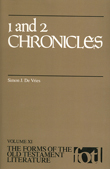
1 and 2 Chronicles
- Author: Simon J. De Vries
- Series Editors: Rolf P. Knierim, Gene M. Tucker, and Marvin A. Sweeney
- Series: Forms of the Old Testament Literature Series (FOTL)
- Publisher: Eerdmans
- Publication Date: 1989
- Pages: 455
In his introduction De Vries sketches the canonical setting of the books of Chronicles, especially in relation with Ezra-Nehemiah, and then discusses the redacted and original versions of Chronicles. He describes Chronicles as genealogical and narrative history that tells who/what ideal Israel is, how it has suffered by its unfaithfulness, and how it will remain true Israel by trusting in God.
S.J. De Vries’s form-critical analysis of 1 and 2 Chronicles is a thoroughly competent treatment of this difficult and much-neglected portion of the Old Testament. The writer’s well-balanced, solid treatment provides a most reliable guide through much unchartered territory and will be welcomed by all serious students of the Bible.
—Brevard Childs, Yale University
Based on impeccable erudition and written with the flair of a pioneer enamored of the landscape, this form-analytical and genre-setting commentary restores to Chronicles the oft-neglected appeal of an unlikely subject: the marriage of genealogy with temple music and splendor for the sake of an ideal Israel.
—Samuel Terrien, Union Theological Seminary
Simon J. De Vries is Professor of Old Testament Emeritus at Methodist Theological School in Ohio. His previous books include Prophet against Prophet and Yesterday, Today and Tomorrow: Time and History in the Old Testament.
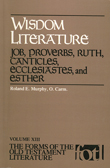
Wisdom Literature: Job, Proverbs, Ruth, Canticles, Ecclesiastes, and Esther
- Author: Roland E. Murphy
- Series Editors: Rolf P. Knierim, Gene M. Tucker, and Marvin A. Sweeney
- Series: Forms of the Old Testament Literature Series (FOTL)
- Publisher: Eerdmans
- Publication Date: 1981
- Pages: 199
Murphy sees three of the six books (Proverbs, Job, and Ecclesiastes) as being technically ‘wisdom literature.’ The others are either love poems or historical narrative that fit well within the context of the subject presented here. In this volume previous form-critical work is carefully evaluated, and the result is a thorough-going form-critical treatment of this part of the Old Testament. The work is enhanced by bibliographies for each Old Testament book and a glossary of general terms.
The work, done with Murphy’s customary learning and good sense, offers a valuable perspective for the interpretation of the wisdom material and will serve many generations of students as a dependable guide.
—Brevard Childs, Yale University
Roland Murphy (1917–2002) was George Washington Ivey Professor of Biblical Studies Emeritus at Duke University and adjunct professor of biblical studies at the Washington Theological Union. He contributed to theThe Song of Songs volume in Hermeneia.
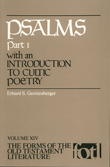
Psalms, Part 1, with an Introduction to Cultic Poetry
- Author: Erhard S. Gerstenberger
- Series Editors: Rolf P. Knierim, Gene M. Tucker, and Marvin A. Sweeney
- Series: Forms of the Old Testament Literature Series (FOTL)
- Publisher: Eerdmans
- Publication Date: 1988
- Pages: 275
Erhard Gerstenberger begins this volume with an examination of the nature of cultic poetry, its role in ancient Near Eastern religion, and more specifically its role in the religion of Israel. He goes on to survey the genres of cultic poetry, including lament, complaint, and thanksgiving, and then focuses on the book of Psalms as an example of cultic poetry, first analyzing the book as a whole and then working through Psalms 1–60 unit by unit.
A well-written, well-documented volume that is a gold mine of form-critical observations.
—John H. Hayes, Candler School of Theology
This commentary is the rich harvest of Professor Gerstenberger’s long investigation of the Psalms. It sets a benchmark for the form-critical study of Israel’s prayers and hymns.
—James Luther Mays, Union Theological Seminary, Virginia
Erhard Gerstenberger is Professor Emeritus of Old Testament Literature at Marburg University in Germany. He is the author of numerous studies of the Old Testament.
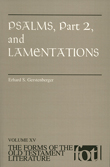
Psalms, Part 2, and Lamentations
- Author: Erhard S. Gerstenberger
- Series Editors: Rolf P. Knierim, Gene M. Tucker, and Marvin A. Sweeney
- Series: Forms of the Old Testament Literature Series (FOTL)
- Publisher: Eerdmans
- Publication Date: 2001
- Pages: 565
This volume completes Erhard Gerstenberger's widely praised discussion of the psalms literature and includes, as well, an admirable study of the book of Lamentations. Gerstenberger interprets the different kinds of songs and prayers that comprise the book of Psalms in light of their socio-historical settings and provides a concise formal and structural analysis of each biblical text based on an illuminating comparison with other ancient Near Eastern prayers and hymns. Seeing the biblical writings in relation to the social, cultic, religious, and theological conceptions of Israel’s neighboring peoples allows contemporary readers to better grasp the purpose and spiritual meaning of the psalms and Lamentations to the Jewish community that composed them.
This is a most important work, surely the most important and most comprehensive form-critical treatment of the Psalms in the last two decades. We have here the fruit of a lifetime of studying the Psalms by one of the foremost interpreters of that literature. It is a first-rate piece of work that will be widely used.
—Patrick D. Miller Jr., Princeton Theological Seminary
Erhard Gerstenberger is Professor Emeritus of Old Testament Literature at Marburg University in Germany. He is the author of numerous studies of the Old Testament.
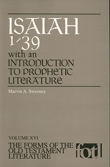
Isaiah 1–39, with an Introduction to Prophetic Literature
- Author: Marvin A. Sweeney
- Series Editors: Rolf P. Knierim, Gene M. Tucker, and Marvin A. Sweeney
- Series: Forms of the Old Testament Literature Series (FOTL)
- Publisher: Eerdmans
- Publication Date: 1996
- Pages: 567
Sweeney’s work on Isaiah 1-39 has become a standard work, offering a detailed analysis of each chapter, lucid background material, and exhaustive bibliographies.
Sweeney’s book marks a major milestone in Isaiah studies. The close examinations of the forms of the prophecies of Isaiah 1-39 and the role that this primary collection has played in the structure and formation of the book of Isaiah as a whole are splendidly shown….This volume must surely become an indispensable starting point for the serious student, and I warmly recommend it.
—Ronald E. Clements, King’s College, London
Marvin A. Sweeney is professor of Hebrew Bible at the Claremont School of Theology and professor of religion at the Claremont Graduate University, Claremont, California. He is the author of numerous works on the Hebrew Bible and Jewish Studies,including Zephaniah in the Hermeneia.
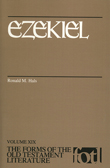
Ezekiel
- Author: Ronald M. Hals
- Series Editors: Rolf P. Knierim, Gene M. Tucker, and Marvin A. Sweeney
- Series: Forms of the Old Testament Literature Series (FOTL)
- Publisher: Eerdmans
- Publication Date: 1989
- Pages: 377
Hals analyzes in detail the structure and intention of the unusually long prophecies of Ezekiel. Because this prophet genuinely qualifies for the designation “theologian,” Hals devotes much attention to examining Ezekiel’s theological perspective and style. He argues that Ezekiel, despite his proclamations of judgment, is not a prophet of despair. Rather, Ezekiel affirms the stubborn grace of Israel’s sovereign Lord—the God who follows his people into the death of exile and loss of nationhood and promises them life out of death via a new exodus, a new “peoplehood,” and a new temple.
Professor Hals tackles a very complicated text of the Bible. Much of the darkness and haze across the pages of Ezekiel clears away because of the author’s long acquaintance with this prophecy and also because of his own clear thinking and uncomplicated style of writing. Students will be helped immensely in rereading the biblical text….
—Carroll Stuhmueller, Catholic Theological Union
Ronald Hals is professor emeritus of Old Testament at Trinity Lutheran Seminary, Columbus, Ohio. He is the author of Grace and Faith in the Old Testament.
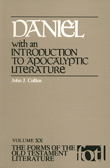
Daniel, with an Introduction to Apocalyptic Literature
- Author: John J. Collins
- Series Editors: Rolf P. Knierim, Gene M. Tucker, and Marvin A. Sweeney
- Series: Forms of the Old Testament Literature Series (FOTL)
- Publisher: Eerdmans
- Publication Date: 1984
- Pages: 132
In his introduction to Jewish apocalyptic literature, Collins examines the main characteristics and discusses the setting and intention of apocalyptic literature. He begins his discussion of Daniel with a survey of the book’s anomalies and an examination of the bearing of form criticism on those anomalies. He explores the book’s place in the canon and the problems with its coherence and bilingualism. Collins provides a section-by-section commentary with a structural analysis (verse-by-verse) of each section.
Using the best and most recent scholarship on apocalyptic literature, Collins places the Book of Daniel in a fresh perspective.
—George Nickelsburg, The University of Iowa
John Collins is Holmes professor of Old Testament Criticism and Interpretation at Yale Divinity School and has served as president of both the Society of Biblical Literature and the Catholic Biblical Association. He is the author of The Bible after Babel, Introduction to the Hebrew Bible, and contributed Daniel in Hermeneia.
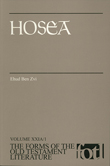
Hosea
- Author: Ehud Ben Zvi
- Series Editors: Rolf P. Knierim, Gene M. Tucker, and Marvin A. Sweeney
- Series: Forms of the Old Testament Literature Series (FOTL)
- Publisher: Eerdmans
- Publication Date: 2005
- Pages: 335
Ehud Ben Zvi’s Hosea features a comprehensive introduction and careful commentary with special attention to themes of exile and restoration, as well as extended discussion of didactic prophetic readings. An excellent form-critical interpretation of the book of Hosea, this volume will be a valuable aid to scholars, students, and teachers.
Ehud Ben Zvi is professor of history and religious studies at the University of Alberta, Edmonton, Canada. His previous books on the Hebrew Bible include Signs of Jonah: Reading and Rereading in Ancient Yehud, A Historical-Critical Study of the Book of Obadiah, and A Historical-Critical Study of the Book of Zephaniah.
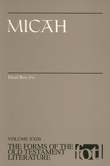
Micah
- Author: Ehud Ben Zvi
- Series Editors: Rolf P. Knierim, Gene M. Tucker, and Marvin A. Sweeney
- Series: Forms of the Old Testament Literature Series (FOTL)
- Publisher: Eerdmans
- Publication Date: 2000
- Pages: 205
Ehud Ben Zvi explores the prophetic book of Micah as a written document that presents itself as YHWH’s word. He examines how Micah was read by its ancient audience and explores the social setting upon which the biblical book stands. Emphasis is placed on the construction of the past, on the images of the future, and on the relevance of both of these to the current community of readers for whom the book was intended. The commentary not only deals extensively with the message of Micah but with the social function of this and other prophetic books in ancient Israel. Ben Zvi’s various lines of investigation lead to a deeper understanding of Micah and its enduring message.
Ehud Ben Zvi is professor of history and religious studies at the University of Alberta, Edmonton, Canada. His previous books on the Hebrew Bible include Signs of Jonah: Reading and Rereading in Ancient Yehud, A Historical-Critical Study of the Book of Obadiah, and A Historical-Critical Study of the Book of Zephaniah.
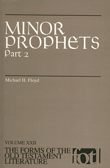
Minor Prophets, Part 2
- Author: Michael H. Floyd
- Series Editors: Rolf P. Knierim, Gene M. Tucker, and Marvin A. Sweeney
- Series: Forms of the Old Testament Literature Series (FOTL)
- Publisher: Eerdmans
- Publication Date: 2000
- Pages: 669
In this volume Floyd presents a complete form-critical analysis of the last six books in the Minor Prophets: Nahum, Habakkuk, Zephaniah, Haggai, Zechariah, and Malachi. By looking carefully at the literary genre and internal structure of each book, Floyd uncovers the literary conventions that help shape the composition of these prophetic books in their final form. His approach yields fresh views of how the parts of each book fit together to make up the whole — particularly with respect to Nahum, Haggai, and Malachi — and provides a basis for reconsidering how each book is historically related to the time of the prophet for whom it is named. This work will be useful to scholars because it advances the discussion regarding the holistic reading of prophetic books, and useful to pastors and students because it shows how analysis of literary form can lead to a more profound understanding of the messages of the Minor Prophets.
Because of its attention to detail and its rhetorical dimension, Floyd’s work is an indispensable tool for studying this portion of Scripture. Its outlines and bibliographies alone are worth the price of the volume. The reviewer highly recommends it to all serious students of the Bible’s prophetic literature.
—Bibliotheca Sacra
This is one of the finest volumes…for anyone doing serious form-critical work in the books Nahum through Malachi…. Particularly impressive are the author’s detailed structural analyses, frequently involving numerous layers of indentation for a passage of a few verses, but the issues of genre and setting are also thoroughly discussed.
—Religious Studies Review
Michael Floyd is St. Michael's and All Angels' Professor of Old Testament at Episcopal Theological Seminary of the Southwest in Austin, Texas.
About the Series Editors
Rolf P. Knierim, professor emeritus of Old Testament, Claremont School of Theology, and Avery Professor of Religion, Claremont Graduate University, California. He is the author of The Task of Old Testament Theology: Method and Cases and coauthor of Numbers in this series.
Gene M. Tucker taught Old Testament at Candler School of Theology, Emory University, in Atlanta, Georgia and is the coauthor of Preaching Through the Christian Year and The Old Testament and the Archaeologist.
Marvin A. Sweeney, Professor of Hebrew Bible at the Claremont School of Theology and professor of religion at the Claremont Graduate University, Claremont, California. He is the author of numerous works on the Hebrew Bible and Jewish Studies, including Isaiah 1–39, with an Introduction to Prophetic Literature in this series.
This title is included in the following collections
You can save when you purchase this product as part of a collection.
Forms of the Old Testament Lit...
$572.81$342.99Logos 6 Methodist & Wesleyan G...
$849.99$594.99Logos 6 Lutheran Platinum Lega...
$1,499.99$1,049.99Logos 6 Anglican Diamond Legac...
$2,999.99$2,099.99
- $2,999.99$2,099.99
- $2,999.99$2,099.99
- $4,749.99$3,324.99
- $4,749.99$3,324.99
- $4,749.99$3,324.99
- $4,749.99$3,324.99
- $8,445.13$6,499.99
- $11,399.99$7,979.99
- $11,399.99$7,979.99
- $11,399.99$7,979.99
- $21,749.99$15,224.99
- $23,999.99$16,799.99
- $24,999.99$17,499.99
- $37,403.33$27,999.99
Reviews
3 ratings

Forrest Cole
11/9/2021
Reuven Milles
7/3/2020

Chan Yew Ming
10/8/2016